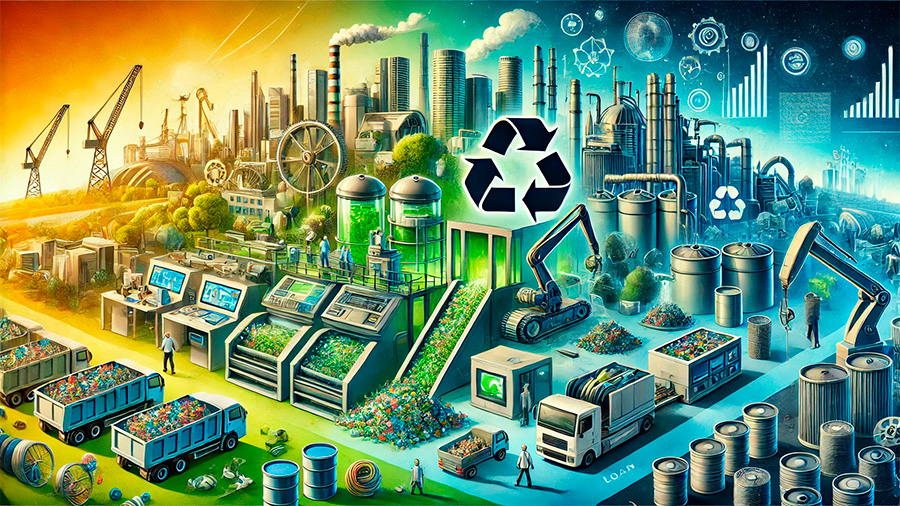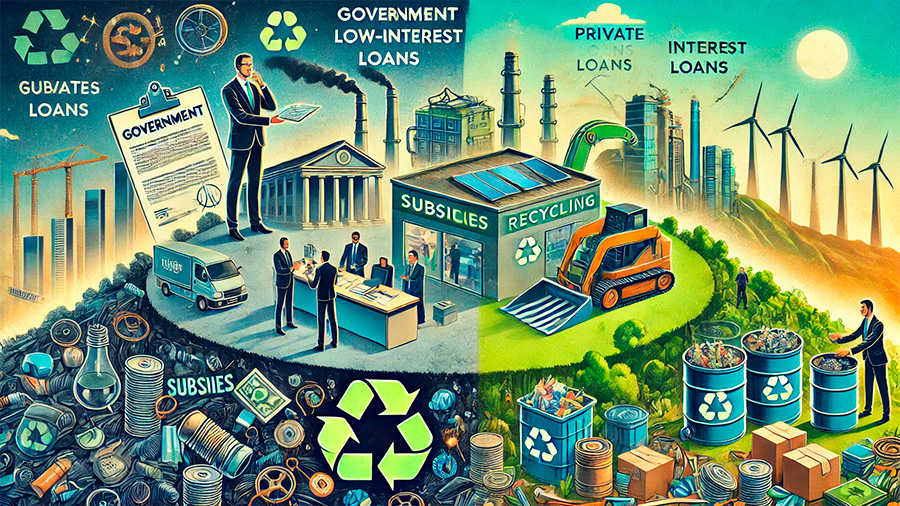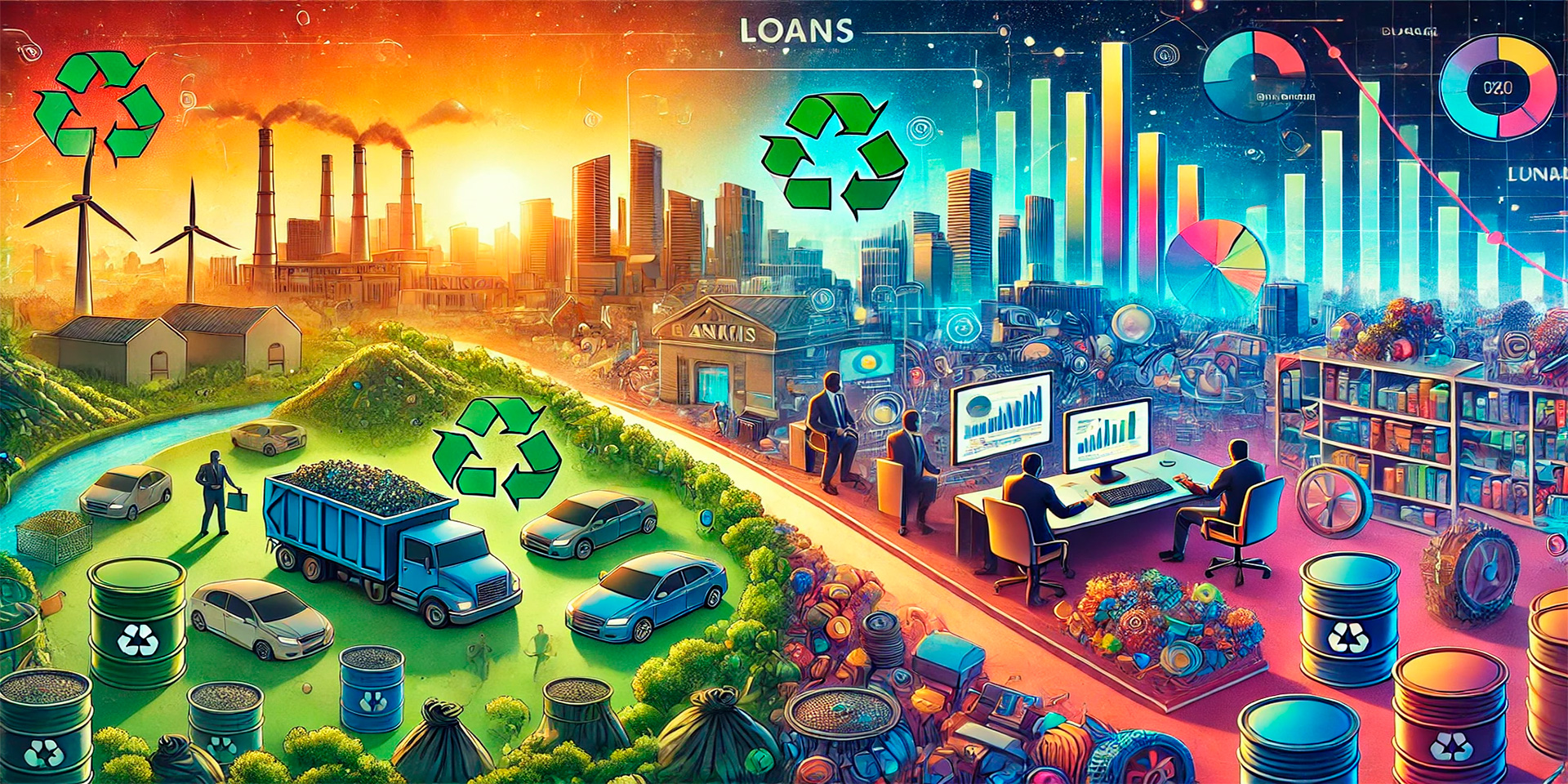The global recycling industry is facing increasing pressure to enhance waste management practices, reduce landfill waste, and promote the reuse of valuable resources. Waste recycling technologies are critical to achieving these goals, but their development often requires substantial investment in research, equipment, and infrastructure. Financial support, especially in the form of loans, plays a pivotal role in driving innovation and expansion within the recycling industry. This article explores how loans are helping to accelerate the development of advanced recycling technologies and transform waste management practices on a global scale.
The Need for Innovation in Waste Recycling
As populations grow and the demand for consumer goods increases, waste generation has surged, putting significant strain on landfills and waste management systems. Traditional recycling methods often fail to meet the challenges of modern waste streams, such as electronic waste (e-waste), plastics, and organic waste. To address these issues, the recycling industry must adopt new technologies that can efficiently handle diverse waste materials, reduce contamination, and recover valuable resources.
1. The Challenges of Modern Waste Recycling
Modern waste recycling is more complex than ever, requiring innovative solutions to manage an increasing volume of waste, diverse materials, and environmental concerns. Recycling technologies must be able to handle a wide range of materials, from mixed plastics to complex e-waste, while maintaining cost-effectiveness and operational efficiency.
Key challenges in waste recycling:
- Increasing volume of waste: As global populations grow and consumption increases, so does the volume of waste generated, making traditional recycling methods insufficient to manage the scale.
- Diverse waste streams: Different types of waste, such as plastics, metals, electronics, and organic materials, require specialized recycling technologies and processes to be efficiently sorted and processed.
- Contamination: Contaminated recyclable materials reduce the quality of the final products and increase the cost of recycling, making it less economically viable.
2. The Role of Loans in Overcoming Recycling Challenges
To meet these challenges, recycling companies require significant capital investment to develop and deploy advanced recycling technologies. Loans provide the necessary financial support to fund research and development, upgrade equipment, and expand recycling operations. By offering low-interest loans, governments and financial institutions help businesses adopt new technologies that improve efficiency and environmental impact.

How Loans Facilitate Innovation in Recycling Technologies
Loans play a crucial role in supporting the growth of the recycling industry by providing businesses with the funds needed to invest in cutting-edge recycling technologies. These financial products help bridge the gap between initial investments in research and the realization of operational efficiencies.
1. Funding Research and Development for New Recycling Methods
Innovative recycling technologies often emerge from extensive research and development (R&D) efforts, which require substantial funding. Loans allow businesses to invest in R&D, explore new recycling processes, and create more effective solutions for handling complex waste materials.
How loans support R&D in recycling:
- Technology development: Financial support enables companies to invest in developing and testing new recycling technologies that can improve efficiency and reduce environmental impact.
- Process optimization: Loans can help businesses upgrade their facilities with advanced equipment and technologies to streamline waste sorting and processing, improving the overall quality of recycled materials.
- Exploring sustainable solutions: With loans, recycling companies can focus on developing environmentally friendly technologies that minimize the carbon footprint of recycling operations and improve sustainability.
2. Expanding Recycling Infrastructure
Expanding the infrastructure required to handle modern waste streams is essential to improving recycling rates. Loans provide the capital needed to build or upgrade recycling plants, implement new waste sorting systems, and improve the logistical aspects of recycling operations, such as transportation and storage.
The role of loans in infrastructure expansion:
- Building new facilities: Loans help businesses establish new recycling plants capable of processing a wider variety of waste materials, increasing their recycling capacity and efficiency.
- Upgrading existing facilities: Financial support enables the modernization of existing plants with state-of-the-art machinery and technology to improve the quality and efficiency of recycling operations.
- Enhancing collection and sorting systems: Loans allow businesses to implement automated sorting technologies and improve waste collection infrastructure to ensure a higher rate of recyclable material recovery.
3. Enabling Innovation in Waste-to-Energy Technologies
Waste-to-energy (WTE) technologies, which convert non-recyclable waste into energy, are becoming an increasingly important part of the circular economy. However, developing and deploying these technologies requires significant upfront investment. Loans are essential for financing WTE projects and facilitating the transition to more sustainable energy solutions.
How loans contribute to WTE technology development:
- Financing new technologies: Loans provide the capital needed to build WTE facilities that can turn waste into valuable energy, reducing landfill waste and providing a renewable energy source.
- Reducing dependence on fossil fuels: By enabling the growth of WTE technologies, loans help reduce reliance on traditional energy sources, supporting the transition to a greener economy.
- Enhancing energy efficiency: Financial support allows for the integration of advanced technologies into WTE facilities, improving the energy efficiency and output of these operations.

How Government and Private Sector Loans Drive Recycling Growth
Both government-backed and private loans are vital to advancing recycling technologies. Governments provide low-interest loans, grants, and subsidies to encourage sustainable waste management practices, while private financial institutions offer more flexible loan options for businesses seeking to scale their operations.
1. Government-Backed Loans and Grants
Governments around the world recognize the importance of recycling in promoting environmental sustainability and economic growth. As such, they provide financial support to recycling businesses through loans, grants, and tax incentives. These programs help businesses adopt innovative recycling technologies, expand operations, and meet sustainability targets.
Government incentives for recycling:
- Low-interest loans: Many governments offer loans with favorable terms to recycling companies, enabling them to upgrade facilities and invest in green technologies.
- Grants and subsidies: Some government programs provide grants to fund specific recycling projects, such as the development of waste sorting technologies or WTE systems.
- Tax incentives: Governments may offer tax credits or exemptions for businesses that implement environmentally friendly practices or invest in sustainable recycling infrastructure.
2. Private Sector Loans for Expanding Recycling Operations
In addition to government support, private financial institutions play an important role in providing loans to businesses seeking to scale their recycling operations. Private loans can help businesses expand their reach, enhance efficiency, and invest in the development of new technologies that address emerging waste challenges.
Private loans in recycling industry growth:
- Flexible financing options: Private lenders offer flexible loan terms, including short- and long-term loans, to help recycling companies manage their cash flow while investing in innovation.
- Strategic partnerships: Financial institutions may partner with recycling companies to fund joint ventures aimed at expanding recycling operations and developing new technologies.
- Risk-sharing models: Private loans often include risk-sharing mechanisms, such as interest-rate swaps or performance-based financing, to mitigate the financial risks associated with developing new recycling technologies.
The Future of Loans in the Recycling Industry
As global attention shifts toward sustainability and environmental responsibility, the demand for advanced recycling technologies will continue to grow. Loans, both public and private, will remain a crucial tool in facilitating this transformation. By providing financial support for innovation, infrastructure expansion, and new technologies, loans will play a central role in helping the recycling industry meet the demands of a circular economy.
1. Unlocking New Technologies with Continued Investment
To achieve more efficient and sustainable recycling systems, continued investment in research and development is essential. Loans will be crucial in financing the next generation of recycling technologies, from advanced sorting systems and automated facilities to new methods of recycling complex materials such as plastics and e-waste.
Opportunities for innovation:
- Robotics and AI: The development of robotic sorting systems powered by artificial intelligence (AI) will help improve waste sorting accuracy and efficiency, reducing contamination and improving recycling rates.
- Chemical recycling: Chemical recycling technologies, which break down plastics into their original monomers, are still in their early stages but hold the potential to revolutionize recycling processes. Loans will help fund the development of these technologies.
- Recycling of complex materials: New technologies are needed to recycle materials like composite plastics, batteries, and e-waste, which require specialized methods and equipment.
2. Supporting Global Recycling Infrastructure
Increased investment in recycling infrastructure is needed to handle the growing volume of waste and diverse material streams. Loans will play a key role in expanding collection and sorting systems, upgrading recycling plants, and integrating waste-to-energy technologies, helping to establish a more sustainable and efficient global recycling network.
Conclusion
Loans are a vital tool in advancing waste recycling technologies and supporting the transition to circular economies. By providing the necessary capital for innovation, infrastructure development, and the adoption of new technologies, loans help the recycling industry address global waste challenges while promoting environmental sustainability. As the demand for recycling solutions continues to rise, both government and private sector loans will play an increasingly important role in driving the future of waste management and supporting the growth of a circular economy.
